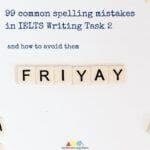Introduction
A strong IELTS-specific vocabulary is essential for achieving a high score on the IELTS exam, as it affects your performance in all four skills: Listening, Reading, Writing, and Speaking.
Expanding your vocabulary for the IELTS exam and retaining new words can be challenging, but it is achievable with the right approach and consistent practice.
In this blog post, we will explore effective strategies and techniques for building and retaining your IELTS vocabulary, helping you maximize your test performance.
Understand the IELTS vocabulary requirements
IELTS requires test-takers to demonstrate a broad vocabulary covering various topics, situations, and academic contexts.
Familiarize yourself with the common themes and subject areas featured in the IELTS exam, such as education, environment, health, technology, transportation, travel, work, culture, society, and media.
For example, when studying the environment topic, focus on words like “sustainability,” “biodiversity,” and “renewable energy.”
In addition to topic-specific vocabulary, it’s essential to build a strong foundation in academic vocabulary, as it plays a significant role specifically in Writing Task 2 and Speaking Part 3.
Academic vocabulary, such as “analyze,” “evaluate,” “hypothesize,” “nevertheless,” and “on the contrary,” are words and phrases commonly used in academic contexts.
By focusing on both topic-specific and academic vocabulary, you will be better equipped to handle various types of questions and tasks in the IELTS exam, ultimately improving your overall performance.
Create a personalized vocabulary list for IELTS
Start by creating a personalized vocabulary list that targets both IELTS subject areas and academic language.
You can find IELTS-specific vocabulary lists online or in preparation books, which can serve as a starting point. Add new words you encounter while reading articles, watching videos, or listening to podcasts related to IELTS topics or academic discussions.
For example, when focusing on the environment topic, you might add words like “conservation,” “deforestation,” and “carbon footprint” to your list.
For academic vocabulary, you could include words like “corroborate,” “disseminate,” and “scrutinize.”
Regularly review and update your list to ensure it remains relevant and useful. Organize the words into categories or themes to make it easier to study and remember them.
Use IELTS vocabulary in context
To effectively retain new vocabulary, it’s crucial to use the words in context. This helps your brain create connections between the words and their meanings, making it easier to recall them later.
Try to incorporate the new words into your daily conversations, writing practice, or even social media posts.
For example, if you’ve recently learned the word “sustainable” from the environment topic, you could write a paragraph about sustainable practices in your community or discuss the concept with a friend.
Another useful technique is to create example sentences using the new words, focusing on different contexts and situations. For instance, if you’ve added the academic word “hypothesize” to your list, you could create sentences like “The researchers hypothesize that exercise can improve mental health” or “Based on the available data, we can hypothesize that the new policy will be effective.”
The more you use a word in various situations, the more likely you are to remember it and be able to use it confidently during the IELTS exam.
Use mnemonic techniques
Mnemonic techniques, such as associating new words with images, memorable phrases, or even stories, can help you remember vocabulary more effectively. These techniques work by creating a memorable link between the word and its meaning, making it easier to recall when needed.
For example, if you’re learning the word “ameliorate,” you might associate it with an image of someone improving a situation, like planting trees to combat deforestation. Alternatively, you could create a memorable phrase or story, such as “Amelia worked hard to ameliorate her neighborhood by organizing a cleanup event.”
Experiment with different mnemonic techniques to find the ones that work best for you. Keep in mind that the more personal and vivid the associations, the more effective they will be in helping you remember the new vocabulary.
Learn word families and collocations
Understanding word families, collocations, and common phrases can significantly improve your vocabulary retention and usage. This approach allows you to learn several related words or phrases simultaneously, making it easier to remember and use them correctly in various contexts.
Word families include different forms of a word, such as its noun, verb, adjective, and adverb forms.
For example, the word family for “develop” includes “development” (noun), “developing” (adjective), and “developed” (adverb).
By learning word families, you can quickly expand your vocabulary and improve your grammatical range.
Collocations are combinations of words that often appear together and sound natural to native speakers. Learning collocations can help you sound more fluent and improve your overall language use.
Examples of collocations are “make a decision,” “take responsibility,” and “conduct research.”
Pay attention to collocations when reading or listening to English and add them to your vocabulary list for practice.
Common phrases are fixed expressions that have specific meanings and are often used in everyday language.
Examples include idiomatic expressions like “break a leg” (meaning “good luck”) and phrasal verbs like “look up” (meaning “search for information”). Familiarizing yourself with common phrases will not only help you understand native speakers better but also enhance your own language skills.
Practice regularly
Consistent practice is key to retaining IELTS vocabulary and improving your overall language skills.
Set aside time each day to review your IELTS word list, use flashcards, or engage in activities that expose you to new words.
You could dedicate 15-30 minutes each day to vocabulary practice, either in a single session or broken into shorter intervals throughout the day.
In addition to reviewing your list, incorporate vocabulary practice into your daily life.
For example, you could listen to podcasts or watch videos on IELTS topics during your commute, read articles during your lunch break, or practice speaking with a language partner in the evenings.
By making vocabulary practice a regular part of your routine, you reinforce your memory and increase the likelihood of retaining the new words you’ve learned.
Engage in various learning activities
To make your vocabulary practice more engaging and enjoyable, it’s important to incorporate a variety of learning activities.
For example, you can read articles related to IELTS topics, watch videos and movies with English subtitles, listen to podcasts, and join online discussion forums.
The diverse exposure to different sources will help you encounter new words in various contexts, making them easier to remember and use.
Additionally, engaging in interactive learning activities, such as group discussions or language exchange programs, can help you practice using the new vocabulary in real-life situations.
These activities also provide an opportunity to receive feedback and correct any mistakes, helping you to improve your language skills further.
Test yourself
Quizzes and games can be an enjoyable and effective way to reinforce your vocabulary learning. They challenge your brain to recall words and meanings, helping to solidify your memory.
There are many online resources, apps, and games available that focus on IELTS vocabulary and can be tailored to your specific needs.
For example, you could use Quizlet to create digital flashcards with vocabulary words and their definitions or use apps like Memrise or Anki to test your recall through spaced repetition.
Another idea is to participate in online word games or crossword puzzles that focus on IELTS topics, which can be both engaging and educational.
Conclusion
Effectively learning and retaining IELTS vocabulary requires a combination of strategic planning, consistent practice, and engaging learning activities. By following the tips and techniques outlined in this blog post, you will be well on your way to expanding your vocabulary and achieving a higher score on the IELTS exam.




0 Comments